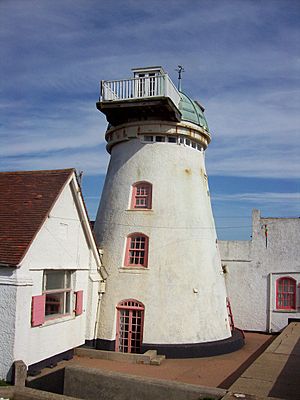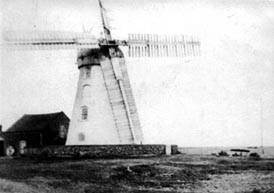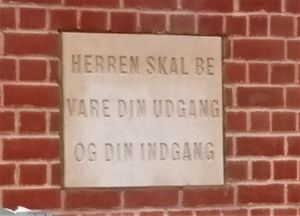Fort Green Mill, Aldeburgh facts for kids
Quick facts for kids Aldeburgh Windmill |
|
|---|---|

The mill in 2007
|
|
| Origin | |
| Mill name | Fort Green Mill |
| Mill location | TM 464 559 |
| Coordinates | 52°08′46″N 1°36′09″E / 52.14611°N 1.60250°E |
| Operator(s) | Private |
| Year built | 1824 |
| Information | |
| Purpose | Corn mill |
| Type | Tower mill |
| Storeys | Four storeys |
| No. of sails | Four sails |
| Type of sails | Patent sails |
| Windshaft | Cast iron |
| Winding | Fantail |
| Fantail blades | Six blades |
| No. of pairs of millstones | Two pairs |
Fort Green Mill is a special type of windmill called a tower mill. It's located in Aldeburgh, a town in Suffolk, England. This old mill, which once ground grain into flour, has now been turned into a home.
A Look Back at Fort Green Mill
Fort Green Mill was built a long time ago, in 1824. For many years, it worked hard grinding corn, which is a type of grain. Imagine the big sails turning in the wind, helping to make flour for bread!
But times changed, and by 1902, the mill stopped grinding corn. It was then changed into a house, so people could live inside it.
During the Second World War, the mill played a different role. It was used as a place to set up guns for defense, helping to protect the area. It's amazing how this old building has had so many different lives!
What Fort Green Mill Looks Like
Fort Green Mill is a tall building with four floors, like a small tower. It used to have four large sails, called patent sails, which were a special design. These sails would catch the wind to power the mill.
The top part of the mill, called the cap, was shaped like a dome. It could turn to face the wind, thanks to a special part called a fantail. This fantail had six blades, like a small propeller, that would spin and automatically turn the cap into the wind.
Inside the mill, there were two pairs of heavy millstones. These big stones would spin against each other to crush the corn into flour. The main shaft that held the sails was made of strong cast iron.
You can find a special message on one of the walls of the mill. It's written in Danish and says: "Herren skal bevare din udgang og din indgang". This means "The Lord shall preserve thy going out and thy coming in," which is a line from an old Bible verse (Psalm 121, verse 8).



